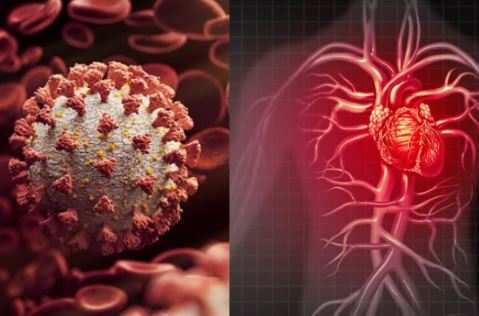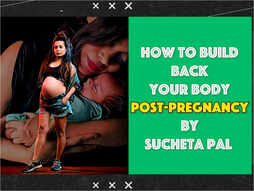Heart ailments remain the biggest killer; here is what you can do
Heart ailments remain the biggest killer; here is what you can do

According to the latest statistics, 1.73 million people have died due to coronavirus. However, it is not still fully clear as to how deadly COVID is, due to the lack of accurate data. But we know that for the longest time, the biggest causes of global death remain cardiovascular issues, respiratory issues and neonatal conditions. And even this year, 2020, heart ailments including ischaemic heart disease, stroke remain the top causes of death. We spoke exclusively to Dr Ramakanta Panda, a leading cardiovascular thoracic surgeon, Managing Director & Vice Chairman, Asian Heart Institute, Mumbai about heart ailments, how COVID affects heart issues and what people can do to keep their heart safe. Here is a lowdown of the conversation
Why does heart ailment remain the top killer even in 2020?
Heart disease has remained the leading cause of death at the global level for the last 20 years. However, it is now killing more people than ever before. The number of deaths from heart disease increased by more than 2 million since 2000, to nearly 9 million in 2019. Heart disease now represents 16% of total deaths from all causes. Lack of primary healthcare, poor nutrition, poor lifestyle and rising stress are the chief reasons why heart disease remains the top killer even in 2020.
Indians are more prone to heart disease for a variety of reasons such as lack of exercise, a poor fibre-deficient, high carbohydrate diet, not monitoring their health parameters regularly, propensity to binge on sweets and alcohol, genetics and so on. During the coronavirus pandemic, this risk for the already vulnerable population increased even further.
What were the most common complaints among heart patients during the pandemic?
Those with heart problems needed medical help but not all were coming forward. Many were afraid of catching the coronavirus at health care facilities. People living with heart problems might be especially wary, since cardiovascular conditions are associated with severe coronavirus disease and a higher risk of death. Others brushed off their symptoms, assuming doctors are too busy with coronavirus patients to treat them. Both the above categories of people- let their problems aggravate and their heart condition got far more severe. Those that reached out for medical help during the pandemic showed excessive stress and anxiety-induced pain. This was over and above the heart disease symptoms. There was also some news that ace-inhibitors (blood pressure medicine) may be harmful- so this was also cause for concern as people stopped taking medicines. This caused their health to worsen.Talking about the most ignored concerns, the period from mid-March to September was characterised by high volume of COVID related work and low availability of doctors. Patients were fearful about what would happen if they visited hospitals. Those that got admitted in emergency were being managed in highly risky environments and many of them, who underwent angioplasty in that period had stent- reblocking; due to various factors.
How does COVID impact the heart?
Cells in the lung and heart are both covered with protein molecules called the ACE-2 protein; this is the doorway that the new coronavirus uses to enter cells and multiply. ACE-2 normally plays a favourable role in protecting tissues by being anti-inflammatory. But if the new coronavirus somehow disables those molecules, these cells may be left unprotected when the immune system springs into action.
Temporary or lasting damage to heart tissue can be due to several factors:
Lack of oxygen: Coronavirus causes inflammation and fluid to fill up the air sacs in the lungs. Hence less oxygen reaches the bloodstream. The heart has to work harder to pump blood through the body, which can be dangerous in people with pre-existing heart disease. The heart can fail from overwork, or insufficient oxygen can cause cell death and tissue damage in the heart and other organs.
Myocarditis: The coronavirus may infect and damage the heart’s muscle tissue directly, as is possible with other viral infections, including some strains of the flu. The heart may also become damaged and inflamed indirectly by the body’s own immune system response.

Stress cardiomyopathy: Viral infections can cause cardiomyopathy, a heart muscle disorder that affects the heart’s ability to pump blood effectively. When attacked by a virus, the body undergoes stress and releases a surge of chemicals called catecholamines that can stun the heart.
Cytokine storm:There is a possibility that our own body’s immune system launches an attack on the invading virus. The body releases a flood of proteins called cytokines that help cells communicate with one another and fight the invaders- these end up destroying healthy tissue and damaging organs such as the kidneys, liver and heart.
What are the lifestyle changes one can follow to protect the heart?
The holy grail of any pandemic is ‘prevention’ and this calls for the age old trio of 45 minutes daily exercise, balanced diet and positive mindset. Further, recent studies have indicated that being even slightly overweight is a major risk factor across age groups; obesity isn't just a cosmetic concern. It is a medical problem that increases your risk of other diseases and health problems, such as heart disease, diabetes, high blood pressure and certain cancers. It also increases the risk of COVID complications substantially. So measure your weight daily- and try and be as close to your ideal weight as possible; maintaining a BMI (Body Mass Index ) between 18.5-24.9. Steam inhalation and daily consumption of vitamin C, vitamin D, Zinc and B complex are a must. However, it is important to check your levels and get a dosage prescribed by the doctor.
The March 2020 issue of the New England Journal of Medicine spoke of the high transmission of SARS-CoV-2 probably arising from other factors, including high viral loads in the upper respiratory tract and the potential for the infected person to shed and transmit virus while asymptomatic. The authors discussed reported high titres of virus in oropharynx early in the course of disease and possibility of increased infectivity during the period of minimal symptoms.” Steam inhalation can be of great help in this scenario to prevent or reduce severity of COVID. Thanks to the lockdown, staying locked up at home for a long time and the uncertainty around the coronavirus pandemic can be a reason for people to get stressed and start having negative thoughts, which is not good for the heart. It is very important to stay calm and be positive. Yoga in the mornings can be a great balancing factor for all. Maintain your social network even remotely and communicate with your friends and family on a regular basis.
Why does heart ailment remain the top killer even in 2020?
Heart disease has remained the leading cause of death at the global level for the last 20 years. However, it is now killing more people than ever before. The number of deaths from heart disease increased by more than 2 million since 2000, to nearly 9 million in 2019. Heart disease now represents 16% of total deaths from all causes. Lack of primary healthcare, poor nutrition, poor lifestyle and rising stress are the chief reasons why heart disease remains the top killer even in 2020.
Indians are more prone to heart disease for a variety of reasons such as lack of exercise, a poor fibre-deficient, high carbohydrate diet, not monitoring their health parameters regularly, propensity to binge on sweets and alcohol, genetics and so on. During the coronavirus pandemic, this risk for the already vulnerable population increased even further.
What were the most common complaints among heart patients during the pandemic?
Those with heart problems needed medical help but not all were coming forward. Many were afraid of catching the coronavirus at health care facilities. People living with heart problems might be especially wary, since cardiovascular conditions are associated with severe coronavirus disease and a higher risk of death. Others brushed off their symptoms, assuming doctors are too busy with coronavirus patients to treat them. Both the above categories of people- let their problems aggravate and their heart condition got far more severe. Those that reached out for medical help during the pandemic showed excessive stress and anxiety-induced pain. This was over and above the heart disease symptoms. There was also some news that ace-inhibitors (blood pressure medicine) may be harmful- so this was also cause for concern as people stopped taking medicines. This caused their health to worsen.Talking about the most ignored concerns, the period from mid-March to September was characterised by high volume of COVID related work and low availability of doctors. Patients were fearful about what would happen if they visited hospitals. Those that got admitted in emergency were being managed in highly risky environments and many of them, who underwent angioplasty in that period had stent- reblocking; due to various factors.
How does COVID impact the heart?
Cells in the lung and heart are both covered with protein molecules called the ACE-2 protein; this is the doorway that the new coronavirus uses to enter cells and multiply. ACE-2 normally plays a favourable role in protecting tissues by being anti-inflammatory. But if the new coronavirus somehow disables those molecules, these cells may be left unprotected when the immune system springs into action.
Temporary or lasting damage to heart tissue can be due to several factors:
Lack of oxygen: Coronavirus causes inflammation and fluid to fill up the air sacs in the lungs. Hence less oxygen reaches the bloodstream. The heart has to work harder to pump blood through the body, which can be dangerous in people with pre-existing heart disease. The heart can fail from overwork, or insufficient oxygen can cause cell death and tissue damage in the heart and other organs.
Myocarditis: The coronavirus may infect and damage the heart’s muscle tissue directly, as is possible with other viral infections, including some strains of the flu. The heart may also become damaged and inflamed indirectly by the body’s own immune system response.

Stress cardiomyopathy: Viral infections can cause cardiomyopathy, a heart muscle disorder that affects the heart’s ability to pump blood effectively. When attacked by a virus, the body undergoes stress and releases a surge of chemicals called catecholamines that can stun the heart.
Cytokine storm:There is a possibility that our own body’s immune system launches an attack on the invading virus. The body releases a flood of proteins called cytokines that help cells communicate with one another and fight the invaders- these end up destroying healthy tissue and damaging organs such as the kidneys, liver and heart.
What are the lifestyle changes one can follow to protect the heart?
The holy grail of any pandemic is ‘prevention’ and this calls for the age old trio of 45 minutes daily exercise, balanced diet and positive mindset. Further, recent studies have indicated that being even slightly overweight is a major risk factor across age groups; obesity isn't just a cosmetic concern. It is a medical problem that increases your risk of other diseases and health problems, such as heart disease, diabetes, high blood pressure and certain cancers. It also increases the risk of COVID complications substantially. So measure your weight daily- and try and be as close to your ideal weight as possible; maintaining a BMI (Body Mass Index ) between 18.5-24.9. Steam inhalation and daily consumption of vitamin C, vitamin D, Zinc and B complex are a must. However, it is important to check your levels and get a dosage prescribed by the doctor.
The March 2020 issue of the New England Journal of Medicine spoke of the high transmission of SARS-CoV-2 probably arising from other factors, including high viral loads in the upper respiratory tract and the potential for the infected person to shed and transmit virus while asymptomatic. The authors discussed reported high titres of virus in oropharynx early in the course of disease and possibility of increased infectivity during the period of minimal symptoms.” Steam inhalation can be of great help in this scenario to prevent or reduce severity of COVID. Thanks to the lockdown, staying locked up at home for a long time and the uncertainty around the coronavirus pandemic can be a reason for people to get stressed and start having negative thoughts, which is not good for the heart. It is very important to stay calm and be positive. Yoga in the mornings can be a great balancing factor for all. Maintain your social network even remotely and communicate with your friends and family on a regular basis.
End of the article
Comments (0)
Featured in Lifestyle

Your hair loss may be linked to COVID

Timeless Christmas quotes from literature

Symptoms of the new COVID strain, as per reports

Revealed: Easiest DIY spa secrets to pamper your face, hair and body

Top 50 Christmas Wishes, Messages and Quotes

Top 10 foods and drinks to protect your liver

Zodiac signs who can’t handle the truth

Over 40? Here are 5 effective weight loss tips for you

Why is Christmas celebrated on the 25th of December?
LATEST VIDEOS
Health-Fitness
 5 yoga asanas to manage and treat diabetes06:04
5 yoga asanas to manage and treat diabetes06:04 Donate blood, save a life! 01:40
Donate blood, save a life! 01:40 A sneak peek into actor and singer Deepti Sadhwani's fitness routine01:59
A sneak peek into actor and singer Deepti Sadhwani's fitness routine01:59 4 healthy diet tips to follow in the winters01:23
4 healthy diet tips to follow in the winters01:23 Stair workout: 8 bodyweight exercises you can do on stairs02:49
Stair workout: 8 bodyweight exercises you can do on stairs02:49 Foods to avoid if you have bad kidneys01:46
Foods to avoid if you have bad kidneys01:46 Ayurvedacharya Dr Partap Chauhan busts some popular food myths05:57
Ayurvedacharya Dr Partap Chauhan busts some popular food myths05:57 12 Min Belly Fat Blast with Eliz _ Abs & Obliques Workout to Slim Your Waist, At Home Fitness, Core12:15
12 Min Belly Fat Blast with Eliz _ Abs & Obliques Workout to Slim Your Waist, At Home Fitness, Core12:15 What happens to your body when you eat almonds?01:25
What happens to your body when you eat almonds?01:25 Bodyweight sit-up circuit01:13
Bodyweight sit-up circuit01:13
StoriesSEE All































































































![[New!] Level 4 - 30 minute tempo fat-burning!
[New!] Level 4 - 30 minute tempo fat-burning!](https://static.toiimg.com/thumb/79327298.cms?width=147&height=86)
















closecomments
SIGN IN WITH
FacebookGoogleEmail